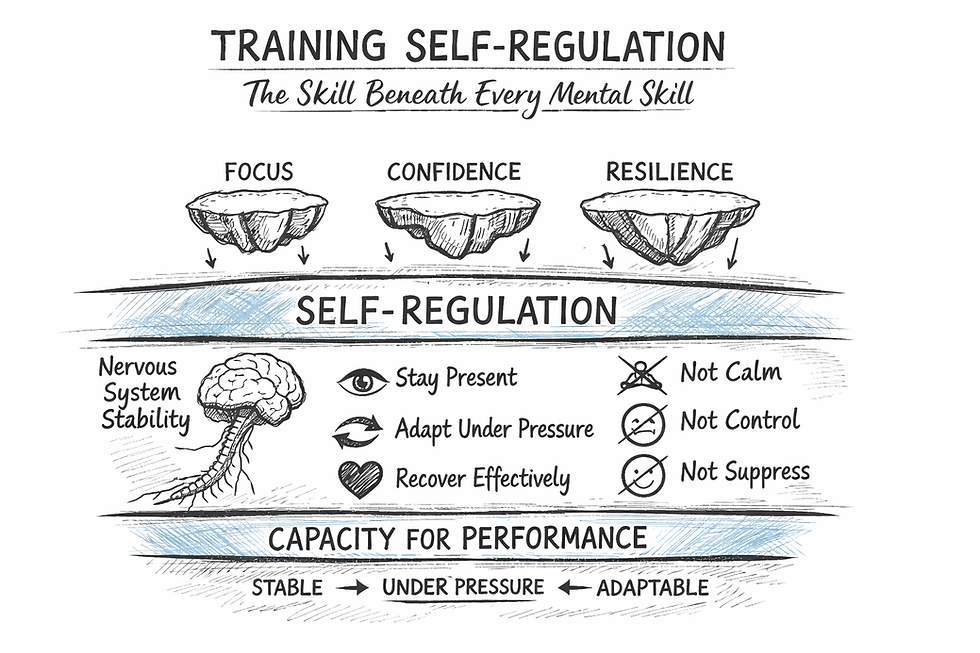Building Confidence in Sports
- Kate Allgood
- Feb 6, 2025
- 4 min read
Updated: Apr 9, 2025
Importance of Confidence in Athletics
Confidence plays a vital role in an athlete's performance. It influences decision-making, resilience, and overall effectiveness in the game. Athletes with high confidence are more likely to take risks, push their limits, and come back stronger after setbacks. Thus, nurturing confidence is essential for long-term success in sports.
1. Develop a Pre-Performance Routine
A consistent pre-performance routine helps you prepare mentally and physically for competition. Following a routine fosters familiarity and control, reducing performance anxiety and boosting confidence.
How to Start:
Identify key actions that calm and focus you (e.g., stretching, breathing exercises, or listening to music).
Practice your routine regularly during training sessions.
Stick to it before every competition to establish a reliable mental state.
Example: Many elite athletes, like Serena Williams, perform specific rituals before matches to feel grounded and ready.
2. Practice Neutral Self-Talk
What you say to yourself has a direct impact on how you feel and perform. Instead of using overly positive or negative language, aim for neutral, constructive self-talk that focuses on facts and actions.
Tips for Neutral Self-Talk:
Replace self-criticism with observations. Change "I’m going to fail" to "I’ve prepared for this moment and will do my best."
Focus on what you can control, such as your effort or strategy.
Use cues like "Stay steady," "Breathe and focus," or "One step at a time" during practice and competition.
Pro Tip: Jot down a few neutral phrases that resonate with you. Revisit them when needed to reinforce a balanced mindset.
3. Visualize Success
Mental rehearsal is a powerful mental tool. You can imagine yourself succeeding in specific scenarios. By mentally rehearsing your performance, you can boost confidence and reduce pre-competition nerves.
Steps to Visualize Effectively:
Find a quiet space and close your eyes.
Picture yourself performing your sport with precision and success. Include as many senses as possible—see the field, hear the crowd, and feel your movements.
Replay this mental image daily, especially before competitions.
Example: Olympic skier Lindsey Vonn often used visualization to mentally ski each course before racing. This method helped her anticipate challenges and perform confidently.
4. Set Goals with the MTO Method
The MTO (Minimum, Target, Outrageous) method is a dynamic way to set goals that account for different levels of achievement, keeping you motivated.
How to Use the MTO Method:
Minimum Goal: Define the baseline outcome you’re confident you can achieve. For example, "Run 3 miles without stopping."
Target Goal: Identify a realistic yet challenging goal. For instance, "Run 5 miles in under 40 minutes."
Outrageous Goal: Set a stretch goal that pushes your limits. An example could be, "Run 7 miles at a consistent pace."
Pro Tip: Regularly review and adjust your goals based on your progress. Celebrate reaching any level of achievement to boost your confidence.
5. Learn from Setbacks
Every athlete faces setbacks. However, how you respond to them shapes your confidence. Treat challenges and failures as opportunities to grow and improve.
Strategies for Learning from Setbacks:
Reflect on what went wrong and identify lessons. Ask yourself, "What can I do differently next time?"
Focus on effort and your improvement rather than solely the outcome.
Surround yourself with supportive teammates, coaches, or mentors who can help you stay positive.
Mindset Shift: Instead of viewing mistakes as failures, see them as learning opportunities that serve as stepping stones toward mastery.
Final Thoughts
Building confidence is an ongoing process that requires intentional effort and practice. By developing a pre-performance routine, practicing neutral self-talk, visualizing success, setting goals using the MTO method, and learning from setbacks, you can create a strong foundation for confidence in sports.
Remember, confidence isn't about being perfect—it's about trusting your preparation and embracing the challenges ahead.
Ready to take your mental game to the next level? Explore our coaching programs designed to help athletes master their mindset and achieve peak performance.
Own your focus. Own your game.
Kate
About Kate Allgood
Kate Allgood is educated in the field of applied sport psychology. She holds two master's degrees in psychology, graduating with distinction. After a successful hockey career, she has spent the past 15 years working one-on-one with high school, college, Olympic, and professional athletes to enhance their mindset, mental performance, and mental skills training. Kate has also been a consultant for professional teams, including the Anaheim Ducks' primary minor league affiliate, the San Diego Gulls, to help the team and players develop their mental game.
It is important to note that while Kate has graduate school training in applied sport psychology and general psychology, she does not diagnose or treat clinical disorders and is not a licensed psychologist.
The information provided is not to dispense medical advice or prescribe the use of any technique, either directly or indirectly, as a form of treatment for physical, emotional, or medical problems without the advice of a physician. The information provided is only to offer information of a general nature to help you in your quest for high performance. If you know or suspect you have a health problem, it is recommended you seek your physician's advice.



Comments